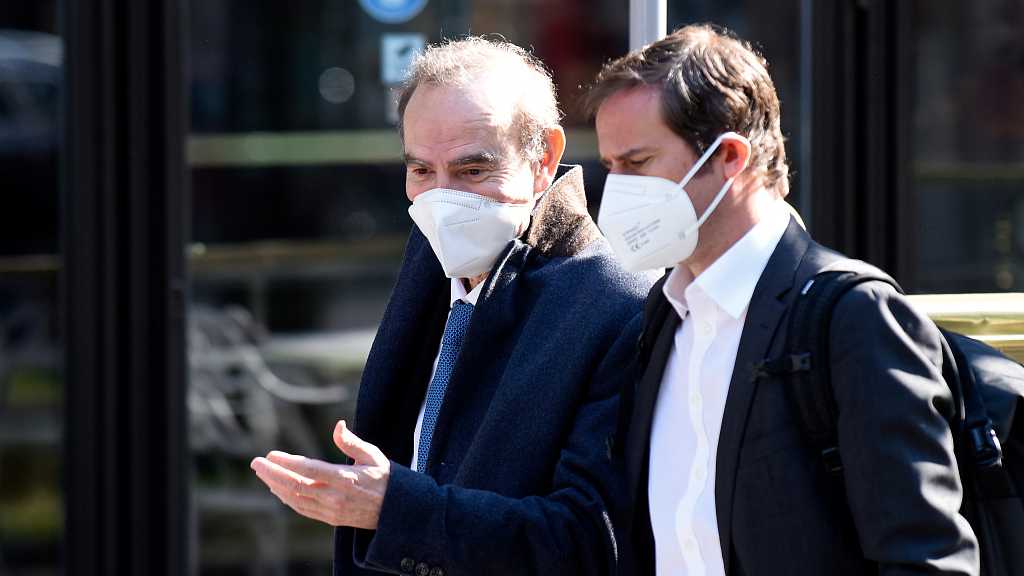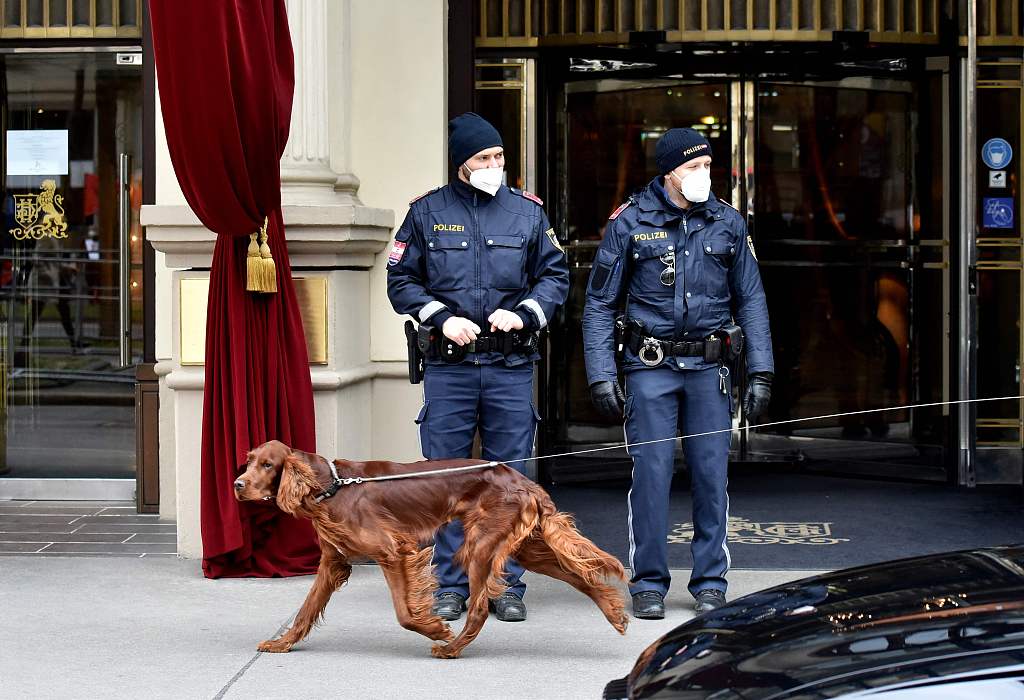
Enrique Mora (L), Deputy Secretary-General of EEAS, arrives at the Grand Hotel on the day the JCPOA Iran nuclear talks are to resume in Vienna, Austria, April 27, 2021. /CFP
Enrique Mora (L), Deputy Secretary-General of EEAS, arrives at the Grand Hotel on the day the JCPOA Iran nuclear talks are to resume in Vienna, Austria, April 27, 2021. /CFP
Editor's note: Bobby Naderi is a London-based journalist, guest contributor in print, radio and television, and documentary filmmaker. The article reflects the author's opinions, and not necessarily the views of CGTN.
It is fitting that the first talks in Vienna between Iran and world powers on how to revive the 2015 nuclear deal, known as the Joint Comprehensive Plan of Action (JCPOA), were suspended. In a year that's been all too difficult, the talks may also collapse next week if both sides do not change their demands and attitudes.
European negotiators claimed Iran had reversed all previous diplomatic progress and fast-forwarded its nuclear program. The EU's chief negotiator, Enrique Mora, said the talks would reconvene soon, but warned that time was not unlimited. Diplomats representing the three European sides at the talks – Britain, France and Germany – also said they were disappointed and concerned by the stalemate.
It is true that Tehran has reversed some of the compromises made, after many months of hard work and fast-forwarded its nuclear program. However, it is also true that it equally sounded negative about the odds of restoring the atomic agreement. The United States is not prepared to lift all sanctions against Iran, including those imposed by President Joe Biden's administration that are not related to the JCPOA.
And honestly, who can deny it? A U.S. negotiating team was also in Vienna, but was not permitted to join the talks, on the basis that former President Donald Trump left the deal in 2018, prodding Tehran to penetrate atomic cutoff points in the deal. As well, no matter how loaded, Biden is still continuing Trump's maximum pressure campaign against Iran since taking office.
All these factors come together powerfully when we realize that the Vienna talks are only partially about Iran's nuclear program and such maneuvres might be the least of the future problems. Both Iran and the U.S. plan on playing the long geopolitical game and are acting from a position of strength. The future is not decided yet and it is a complex challenge in a new world order that is emerging, with the U.S. in retreat across the Middle East and Asia after the humiliation in Iraq and Afghanistan.
There is a way out though, and that includes awakening to the unpleasant realities. The goal should be not so much over restoring the nuclear deal, but ending hostilities and double standards. Keeping the peace in the Middle East should be an essential goal as well, since a new aggressive war would be a disaster for the region. None of this will be easy. However, instead of coming up with unrealistic demands or threats, all parties need to have confidence in themselves and the current diplomatic path.

Policemen guarding the entrance to the Grand Hotel Wien during the closed-door nuclear talks with Iran in Vienna where diplomats of the EU, China, Russia and Iran hold their talks, April 16, 2021. /CFP
Policemen guarding the entrance to the Grand Hotel Wien during the closed-door nuclear talks with Iran in Vienna where diplomats of the EU, China, Russia and Iran hold their talks, April 16, 2021. /CFP
Now, admittedly, it helps no one to claim that Iran is carrying out nuclear blackmail as a negotiating tactic. This should be answered by an immediate halt to the implementation of tough measures by world powers. There is no evidence to support the claim that Iran has no intention of reducing its nuclear activity back to the JCPOA levels and is only trying to buy time to develop a nuclear bomb. Tehran was forced to take steps to advance its nuclear program in the face of pressure from Washington. Therefore, a JCPOA revival would reverse all those steps.
Regrettably, the planning for confrontation with Iran continues elsewhere and it risks harming wider talks. The U.S. has threatened to confront Iran at the International Atomic Energy Agency (IAEA) next month, if it does not let the agency re-install cameras at a workshop after an attack in June. According to the State Department's special envoy for Iran, Robert Malley, Washington will not "sit idly" if Tehran chooses to stall the talks and advance its atomic program to the point it's "too close" to a working weapon. The problem here is that Iran doesn't do anything under pressure.
Some might say these comments are also about the Biden administration trying to appease a disgruntled Israel, and that its tougher Iran policy is designed to placate Tel Aviv, whose objections seem to center around the pact getting in the way of its decades of agitating for war against Iran. Again, Iran has made clear that it doesn't want war. Iran also doesn't want a new deal that constrains its military capabilities.
Add to this Biden's approval rating which is low and the need to defeat Trump who will run for president in 2024. Biden may revive the JCPOA, but with new conditions to show that he has adopted a tougher Iran policy. This is a problem that could easily double down on an undiplomatic tirade of "the deal may go either way." It's an evil that could easily come up with "we may walk away" shtick, or overtly change horses in the middle of the race after a new agreement is reached.
With the American spin machine on overdrive, expect the current hostility and impasse between Iran and the U.S. to drag on, which could lead, all too literally, to an explosive situation, the deliberate disruption and sabotage of the ongoing nuclear diplomacy. In every sense of the phrase, no one in Washington would mind that, would they? Of course not! Whatever happens in Vienna next week, there is still an open invitation to more sanctions, flexing muscles for Tehran in the name of upholding international law and regional security.
(If you want to contribute and have specific expertise, please contact us at opinions@cgtn.com.)

